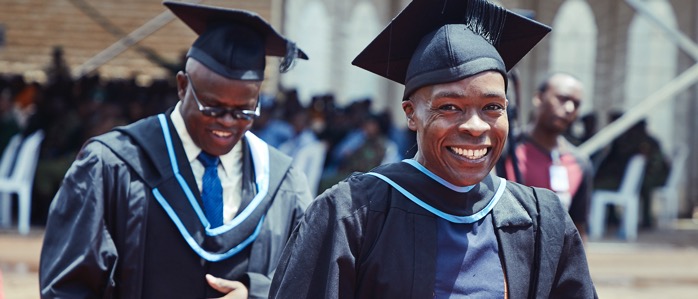In this guest blog, Matteo Cassini, Community Development Manager at Justice Defenders talks about their work in Uganda and Kenya. Their project works with the University of London, delivering legal education and breaking down barriers between prisoners and prison staff.

Prisoner staff relations
The traditional understanding of the role of the prison-staff has been a custodian who is only concerned with discipline and security. When Justice Defenders, known as JD (formerly the African Prisons Project) started working in East Africa that was the entrenched idea within the prisons of Uganda and Kenya.
As a result, the fragile relationship between the prison warder and the inmate was one of authority and subjects, one which would often disintegrate, leading to riots and violence within prisons. In reaction, authorities would use forceful measures to keep order, reinforcing the imbalanced power dynamics within prison and compromising existing rehabilitative practices too.
Often, it would be the prison officers who would teach the inmates, further entrenching the status quo of top-down relationship between the two. One big oversight in this model was the learning participation of the prison officers, whose professional development pathways are regularly overlooked.
Over the past decade, although education within prison was seen as a tool for rehabilitation, it was only focused towards prisoners. Often, it would be the prison officers who would teach the inmates, further entrenching the status quo of top-down relationship between the two.
One big oversight in this model was the learning participation of the prison officers, whose professional development pathways are regularly overlooked. This would contribute to the cynicism of prison officials towards the education needs of prisoners, in particular for higher education, feeding into a cycle of power imbalance, fragile relationships, eventual disorder and reactionary use of force.
Change from the inside
By placing the power of the law in the hands of those further from justice, the dynamics of the prison system are changed from inside.
In order to address these challenges Justice Defenders (JD) introduced an innovative model for defending justice with defenceless communities through legal education, training, and practice. Rather than bring in outsiders to provide legal advice and education, JD equip the prisoners and prison officers to become advocates for themselves and others. By placing the power of the law in the hands of those further from justice, the dynamics of the prison system are changed from inside.
between 2018 and 2020, 23 students have already graduated with a Bachelor’s degree from the University of London and 45 more students are now studying for their degree.
In partnership with the University of London, Justice Defenders supports both prisoners and prison staff to study the distance learning law degree course run by the University of London.
So far, between 2018 and 2020, 23 students have already graduated with a Bachelor’s degree from the University of London and 45 more students are now studying for their degree. Justice Defenders are effectively running law schools in prison with a view to bringing about long term change. The students are not studying courses specially tailored for people in prison but the standard University of London international course.
Education for everyone involved
Creation of this model has contributed towards fostering better prison governance, a climate of respect for prisoners’ rights, greater social cohesion and a more positive, rehabilitation-oriented atmosphere. Within the classroom prison wardens are no longer seen as enforcer of security and discipline: rather they are in a collective journey towards the common goal of a legal degree and a better future.
Participants report improved relationships between the students and the prison service… reducing the prospect of riots and reactionary use of force to maintain order.
The participation in the programme helps the prison officers look at education from the outside and to value the purpose of higher education. Participants report improved relationships between the students and the prison service, which contributes to address power imbalances and prison authorities’ cynicism, reducing the prospect of riots and reactionary use of force to maintain order.
Legal training and support
The impact of the legal education is not, however, limited to change of relationship dynamics alone. JD elevate the participating prison staff as leaders within prison communities and transform them into defenders of the defenceless.
This is an important aspect of the legal education provided within prison. The prisoners and prison staff studying law are also trained as paralegals, providing basic legal advice and support from their peers drawing from the legal knowledge and skills acquired from their law classes.
Over 5,000 went on to represent themselves in court and obtained release so that they were able to return to their families
In 2019 alone, Justice Defenders’ prisoner paralegals advised 13,634 prisoners in the legal aid clinics and over 5,000 of them went on to represent themselves in court and obtained release so that they were able to return to their families. In the 36 prisons where Justice Defenders operate, there are legal clinics held five days a week providing free legal advice to any and all prisoners. Even during Covid-19, it has been possible for some of the clinics to keep running. The advice is given by fellow prisoners and officers who really understand what their inmate clients are going through.
As the prisoners realise that prison officers are not solely interested in keeping them within four walls of the prison, it starts a channel of communication which can be the building blocks of a relationship based on trust
This has led to a significant transformation of the image of the prison staff as they are not only looking to secure prisoners, but are willing to use the legal avenues to help release prisoners who should not be there in the first place.
As the prisoners realise that prison officers are not solely interested in keeping them within four walls of the prison, it starts a channel of communication which can be the building blocks of a relationship based on trust. With the value of legal education instilled in the prison service, the paradigm shift that JD brought is likely to have sustainable impact throughout the operations of the justice system.
Through this model, Justice Defenders is radically transforming the nature of relationship between the prison service and prisoners, improving on the educational qualification and background of the prison officers and introducing a new model of prison management based on trust and solidarity.
This is part of the Prison University partnerships blog series, which shines a spotlight each month on an example of prisons and universities working in partnership to deliver education.
If you would like to respond to the points and issues raised in this blog, or to contribute to the blog yourself, please contact Helena.